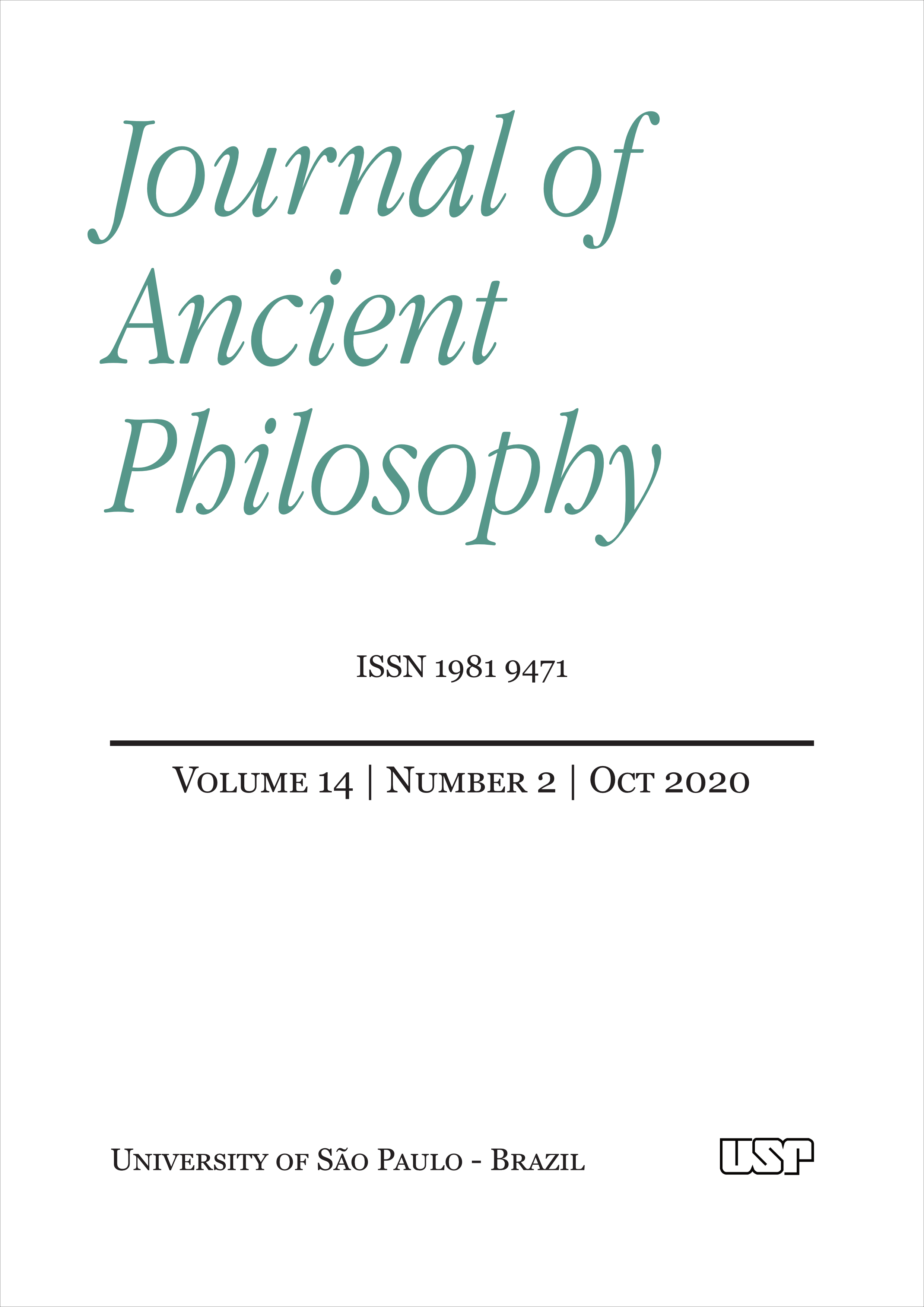Terapia, Diagnóstico e Cura: o Problema do Tempo em Sêneca
DOI:
https://doi.org/10.11606/issn.1981-9471.v14i2p172-194Palavras-chave:
Sêneca, terapia, tempoResumo
In this paper I argue that Seneca’s philosophy is a form of therapy and that one of its main concerns is the transformation of one’s life through time control. Aristotelian tradition lies in the idea that philosophy is, in its highest aspect, an abstract form of knowledge. Seneca, on the other hand, is an inheritor of a long tradition that takes philosophy as mind or soul therapy and bases its structure in a practical approach. Epicurus, for instance, goes as far as to declare that “empty is the word of the philosopher by whom no human suffering is treated”. Even if Seneca doesn’t despise the theoretical principles that support the construction of a philosophical system, he builds, in his Letters to Lucilius, a strong therapeutic praxis whose purpose is to heal one’s mind and life. The upmost and fundamental step is providing the pupil with different ways of earning back time deprivation. Time seems to be, in a certain sense, the essential matter of Seneca’s philosophy. Time control, for him, is a kind of self-control that would make it possible to match a simple existence and a meaningful life. Therefore, Seneca’s opening letter to Lucile aims exclusively to identify how one loses time and why it’s essential to take control of it.
Downloads
Referências
Agostinho (1877). Confessionum libri XIII. Patrologia Latina Cursus Completus. Ed. J.-P. Migne. Series Latina, Tomus XXXII. Parisiis: Apud Garnier Fratres.
Aristóteles (1975). Aristotle's Metaphysics: a revised text with introduction and commentary. 2 Vols. Ed. W. D. Ross. Oxford: The Clarendon Press.
Aulo Gélio (1968). A. Gelli Noctes Atticae. Vols. 1-2. Recognovit brevique adnotatione critica instruxit K. Marshall. Oxonii: e Typographeo Clarendoniano.
Cícero (1965). Tusculanae Disputationes. M. Pohlenz. Stutgardiae: B.G. Teubner.
Edwards, Catharine (2014). Ethics V: death and time. In: Damschen, Gregor; Heil, Andreas (org.). Brill’s Companion to Seneca Philosopher and Dramatist. Leiden, Brill,. p. 323-341.
Marco Aurélio (1968). The Meditations of the Emperor Marcus Antoninus, Vol. 1: Text and Translation. Edited with Translation and Commentary by A. S. L. Farquharson. Oxford: The Clarendon Press.
Meineke, August (1856). Iohannis Stobaei Florilegium. Recognovit Augustus Meineke. Lipsiae: Sumptibus et Typis B. G. Teubnerii.
Pohlenz, M. (1965). Tusculanae Disputationes. M. Tulli Ciceronis Scripta Quae Manserunt Omnia. Fasc. 44. Stutgardiae: in aedibus B. G. Teubnerii.
Pötscher, Walter (1969). Porphyrios, Πρὸς Μαρκέλλαν. Griechischer Text, herausgegeben, übersetzt, eingeleitet und erklärt. Leiden: Brill.
Schenkl, Heinrich (1916). Epicteti Dissertationes ab Arriano digestae. Lipsiae: in aedibus B. G. Teubnerii, Editio maior.
Setaioli, Aldo (2014). Philosophy as Therapy, Self-Transformation and “Lebensform”. In: Damschen, Gregor; Heil, Andreas (org.). Brill’s Companion to Seneca Philosopher and Dramatist. Leiden, Brill. p. 239-256.
Sêneca. L. (1965). Annaei Senecae ad Lucilium Epistulae Morales. Vols. 1-2. Recognovit et adnotatione critica instruxit L. D. Reynolds. Oxonii: e Typographeo Clarendoniano.
Sêneca. L. (1977). Annaei Senecae Dialogorum Libri Duodecim. Recognovit brevique adnotatione critica instruxit L. D. Reynolds. Oxonii: e Typographeo Clarendoniano.
Smith, R. Scott (2014). Physics I: body and soul. In: Damschen, Gregor; Heil, Andreas (org.). Brill’s Companion to Seneca Philosopher and Dramatist. Leiden, Brill,. p. 343-361.
Tomás de Aquino (1971). In duodecim libros Metaphysicorum Aristotelis expositio. Ed. M. R. Cathala, R. M. Spiazzi. 2ª ed. Taurini-Romae: Marietti.
Usener, Hermann (1887). Epicurea. Edidit Hermannus Usener. Lipsiae: in aedibus B. G. Teubnerii.
von Armin, Hans (1964). Stoicorum Veterum Fragmenta, vol. II: Chrysippi fragmenta logica et physica. Stutgardiae: in aedibus B. G. Teubnerii.
von Armin, Hans (1964). Stoicorum Veterum Fragmenta, vol. III: Chrysippi fragmenta moralia, fragmenta successorum Chryssipi. Stutgardiae: in aedibus B. G. Teubnerii.
Downloads
Publicado
Edição
Seção
Licença

Este trabalho está licenciado sob uma licença Creative Commons Attribution 4.0 International License.
Autores que publicam nesta revista concordam com os seguintes termos:- Autores mantém os direitos autorais e concedem à revista o direito de primeira publicação, com o trabalho simultaneamente licenciado sob a Licença Creative Commons Attribution (CC 4.0) que permite o compartilhamento do trabalho com reconhecimento da autoria e publicação inicial nesta revista.
- Autores têm autorização para assumir contratos adicionais separadamente, para distribuição não-exclusiva da versão do trabalho publicada nesta revista (ex.: publicar em repositório institucional ou como capítulo de livro), com reconhecimento de autoria e publicação inicial nesta revista.
- Autores têm permissão e são estimulados a publicar e distribuir seu trabalho online (ex.: em repositórios institucionais ou na sua página pessoal) a qualquer ponto antes ou durante o processo editorial, já que isso pode gerar alterações produtivas, bem como aumentar o impacto e a citação do trabalho publicado (Veja O Efeito do Acesso Livre).


